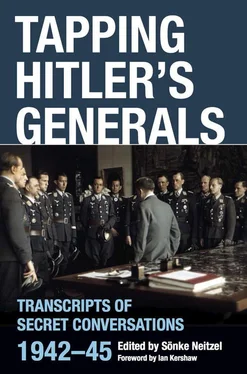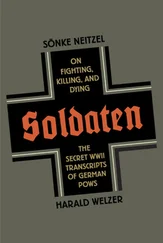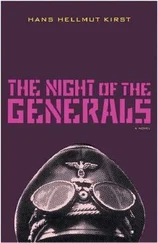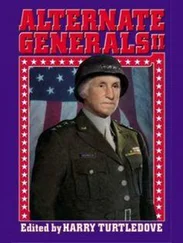From 1794 in the French Revolution three marshals were guillotined: Augustin-Joseph de Mailly (b. 1708), Philippe de Noailles, Duc de Mouchy (b. 1715) and Nicolas Luckner (b. 1722), a native of the Oberpfalz.
See notes 407 407 On 8.8.1944 the following eight officers involved in the 20 July plot were hanged at Berlin Plötzensee prison: Robert Bernardis, Albrecht von Hagen, Paul von Hase, Erich Hoepner, Friedrich Karl Klausing, Hellmuth Stieff, Erwin von Witzleben, Peter Graf Yorck von Wartenburg. Fest, ‘Staatsstreich’, pp. 300–4.
and 479 479 For Hoepner see notes 414 and 415 above.
below.
Julius Streicher (12.2.1885–16.10.1946) was one of the earliest NSDAP members and founded the violently anti-Jewish weekly newspaper ‘Der Stürmer’ in 1923. From 1929 he was Gauleiter of Central Franconia (Mittelfranken). His rise to riches led to a Party inquiry that deprived him of his offices in 1940. He continued to publish the newspaper. He was condemned to death at Nuremberg and hanged.
Generalfeldmarschall Erwin von Witzleben (4.2.1881–8.8.1944), from 2.10.1938 C-in-C, Gruppenkommando, Frankfurt am Main; 1.9.1939 C-in-C, 1.Armee; 26.10.1940–28.2.1942 C-in-C West. Steinbach, ‘Zwischen Gefolgschaft, Gehorsam und Widerstand’.
On 8.8.1944 the following eight officers involved in the 20 July plot were hanged at Berlin Plötzensee prison: Robert Bernardis, Albrecht von Hagen, Paul von Hase, Erich Hoepner, Friedrich Karl Klausing, Hellmuth Stieff, Erwin von Witzleben, Peter Graf Yorck von Wartenburg. Fest, ‘Staatsstreich’, pp. 300–4.
From 1.4.1939 Spang was CO, Lower Rhine Fortifications and as such was subordinate to von Witzleben (see note 406 406 Generalfeldmarschall Erwin von Witzleben (4.2.1881–8.8.1944), from 2.10.1938 C-in-C, Gruppenkommando, Frankfurt am Main; 1.9.1939 C-in-C, 1.Armee; 26.10.1940–28.2.1942 C-in-C West. Steinbach, ‘Zwischen Gefolgschaft, Gehorsam und Widerstand’.
above). Between 16.9 and 15.11.1940 Spang was Chief of Staff, 1.Armee and worked alongside von Witzleben.
Generaloberst Ludwig von Beck (29.6.1880–20.7.1944), from 1.7.1935 to 8.8.1938 Chief of the Army General Staff.
Between 1925 and 1934 Spang served with Artillery Reg.5, of which Ludwig Beck was CO from 1.2.1929 to 1.10.1931.
Lieutenants Hanns Ludin and Richard Scheringer, and Oberleutnant Hans Friedrich Werdt established contacts with the NSDAP in 1929 for the purpose of forming National Socialist cells within the Reichswehr, and published a broadsheet calling for a ‘national revolution’. The three officers were arrested on 10/11.3.1930 and charged with preparing an act of high treason. The Reich Court at Leipzig sentenced them to 18 months’ military prison on 4.10.1930. As Regimental CO, Beck expressed to the court his understanding for the motives of the accused, which arose from a sense of national idealism, and condemned them only on disciplinary grounds. Bucher, ‘Reichswehrprozess’; Klaus-Jürgen Müller, ‘Beck’, pp. 61f, 331–4.
Generalfeldmarschall Gerd von Rundstedt, 1.3.1942–2.7.1944 and 5.9.1944–10.3.1945 C-in-C West. He replaced Feldmarschall Erwin von Witzleben in this position.
Gerd von Rundstedt spoke excellent French and had a friendly correspondence with Marshal Pétain. The statement that he attempted to spare the French people appears more than dubious on the basis of contemporary research. ‘Das deutsche Reich und der Zweite Weltkrieg, Vol. 5/2, pp. 174–81. See also Ziemke, ‘Gerd von Rundstedt’. The affair is clarified in Peter Lieb’s published dissertation ‘Das deutsche Westheer in die Eskalation der Gewalt’.
Generaloberst Erich Hoepner (14.9.1886–8.8.1944) probably met Spang in World War I as a Staff Officer.
Hoepner proved himself a very able panzer leader in the Polish, French and Russian campaigns. After ordering 4.Pz.Armee to retreat from Moscow on 8.1.1942 he was relieved of command and discharged the Wehrmacht for cowardice and disobeying orders. He was also deprived of the right to wear uniform and decorations. Hitler was so enraged by other unauthorised retreats that he decided to make an example of Hoepner. In Berlin, Hoepner contacted Olbricht and took an active part in planning the coup d’état of 20 July. He was sentenced to death by the People’s Court on 8.8.1944 and executed by hanging at Berlin-Plötzensee prison the same day.
Paul von Hase (24.7.1885–8.8.1944), from 15.11.1940 to 20.3.1944 City Commandant, Berlin and a leading figure in the attempted coup. October 1905 joined Kaiser-Alexander-Garde-Grenadier-Reg.1; 1921 married a Latvian from Mitan, Margarethe Freiin von Funck. Hase had four children (Alexander, Ina, Maria and Friedrich-Wilhelm). Kopp, ‘Paul von Hase’.
At 1600hrs on 20.7.1944, Keitel passed the following order to all Wehrkreis commanders by telephone or signal, ‘All orders from the Bendler-Strasse bearing the signatures of Generaloberst Hoepner, Feldmarschall von Witzleben, Gen.d.Inf. Olbricht or Gen.Oberst Fromm are invalid. These generals are to be considered mutineers. Oberst Graf von Stauffenberg carried out the attempt on the Führer’s life. Henceforth only the orders of the Reichsführer-SS and the Chief of the OKW are to be obeyed. All measures “Walküre” are to be cancelled. Closest liaison is to be maintained with the Gauleiters, senior SS and police chiefs.’ Since this order was also passed by telephone, there may be minor differences between the various texts. A mention of Halder in this connection is unproven and probably the result of an error of memory. The order is reproduced in, inter alia , ‘Tätigskeitsbericht Schmundt’, p. 165.
SA-Obergruppenführer and General der Polizei Wolf Heinrich Graf von Helldorf (14.10.1896–15.8.1944); 1926 joined NSDAP; 1932 SA-Führer, Berlin-Brandenburg; 1932 Member Prussian Parliament; 1933 Member Reichstag; July 1935 Police President of Berlin. Despite his Nazi past and involvement in wrongdoings of the regime, from 1938 he was involved in the resistance, consorting with Goerdeler’s circle, and was involved in the coup plot of 20 July 1944.
Close contact between Stauffenberg and Choltitz is not confirmed by research.
It is not known with which SS-Oberführer Choltitz spoke immediately after the attempt. LXXXIV.Armeekorps, which he commanded at that time, was subordinate to 17.SS-Pz.Grenadier-Div. ‘Götz von Berlichingen’ under SS-Brigade-Führer Otto Baum. What contact Choltitz had with Baum is unknown. In his memoirs, he mentioned only a conversation with his own Chief of Staff about the assassination attempt. During the train journey from FHQ Wolfsschanze to Berlin on the night of 7.8.1944, Choltitz talked with Reichsleiter Robert Ley, whom he did not know, and who explained to him the new Sippenhaft Law, which allowed the arrest of a traitor’s kith and kin. Choltitz, ‘Brennt Paris?’ p. 13f, on Sippenhaft see, for example, Hett/Tuchel, ‘Die Reaktionen des NS-Staates’, pp. 383–8.
Generalleutnant Friedrich Brieth (25.5.1892–9.7.1982) commanded from 5.4.1943 to 24.5.1944 Artillery School I in Berlin. It trained artillery and regimental commanders.
Читать дальше








![Traudl Junge - Hitler's Last Secretary - A Firsthand Account of Life with Hitler [aka Until the Final Hour]](/books/416681/traudl-junge-hitler-s-last-secretary-a-firsthand-thumb.webp)



